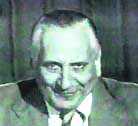The deafening silence during the blackout would contrast with the blasting sound of ack-ack guns and air raid sirens for Amritsar residents during the 1965 war. For me, another sound still rings clearly in the ears 50 years later — the majestic, baritone commentary of Melville de Mellow.
The iconic broadcaster from All India Radio was assigned to cover the Lahore sector. “Sunbeam”, the house of my uncle GR Sethi on Rattan Chand Road off The Mall, had become the hub of media activity, where journalists would gather to file stories from the warfront. Many Army officers posted at the border would converge at the house to share information about the military operations to dispel rumours and boost the morale of the troops and the country.
Melville came to our house during the last week of the war and I was asked to keep him company; I was immediately taken in by his warmth and affection.
His two brilliant commentaries, in his inimitable and brilliant English narration, on the Indian Army’s occupation of Burki and Dograi need to be broadcast again to remind people of AIR’s efforts during those trying times to galvanise the nation.
His narration proved to be a formidable counter to the false propaganda broadcast from Pakistan. I also vividly recall Akashvani’s satirical news bulletin mocking the war claims of Radio Pakistan and it used to be begin with: “Yeh Radio Jhootistan hai.”
Melville de Mellow, who passed away in 1989 at the age of 76, was best known for his non-stop seven-hour commentary from a van of AIR on Mahatma Gandhi’s last journey in 1948. But this legendary radio personality would leave his mark everytime he would go on air.
It was a live war for us youngsters — watching dogfights between our small and agile Gnats and the sophisticated American-made Sabre jets of the Pakistanis. I have a vivid recollection of many such chases by the Gnats, flown by the likes of the famous Keelor Brothers — a classic example of the superiority of man over machine which saw many Sabres being shot down in and around Amritsar.
A story did the rounds then of “Raju”, the gunner, heading the anti-aircraft squad and defending the city from the attacking Pakistan Air Force fighters.
As youngsters, we were drafted into Civil Defence as volunteers to patrol the lanes and bylanes at night to ward off anti-national elements since rumours were floating that some Pakistani intruders had entered the city. I was 17 then, a college student. I remember how Melville took my interview to show how young Amritsaris were helping in keeping the residents’ morale high.
The city, which had witnessed the horror of the Jallianwala Bagh massacre in 1919 and the Partition trauma, had geared up to welcome soldiers marching towards the border, offering food, water and essential personal items.
Many Army officers would narrate stories about the tremendous help offered by the farming community in the villages along the border, as they would bring freshly-cooked food to the defence lines and bunkers.
Punjabi truckers too had put in all their resources and offered their transport free of cost to ferry arms and ammunition at railway sidings from Beas, Ambala Cantonment, Jalandhar, etc, to the border outposts.
Amritsar is grateful to Lt Gen Harbaksh Singh, the countless celebrated and unsung soldiers, the resolute residents and of course to Melville de Mellow. RIP.
The writer and his late uncle were associated with The Tribune
Unlock Exclusive Insights with The Tribune Premium
Take your experience further with Premium access.
Thought-provoking Opinions, Expert Analysis, In-depth Insights and other Member Only Benefits
Already a Member? Sign In Now










